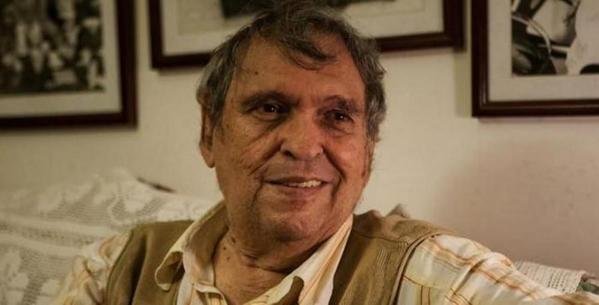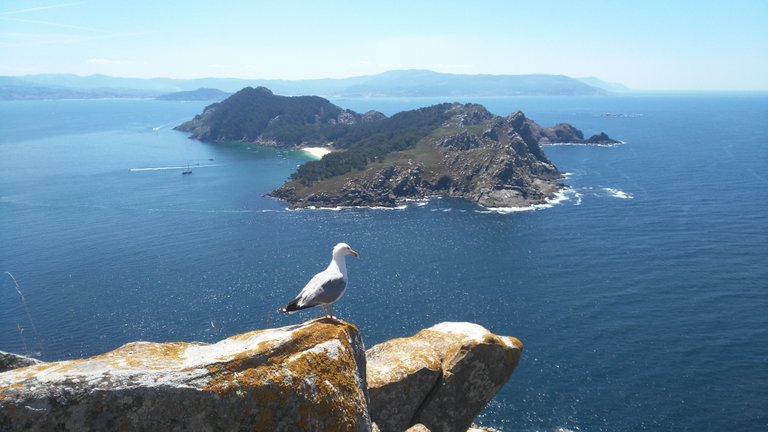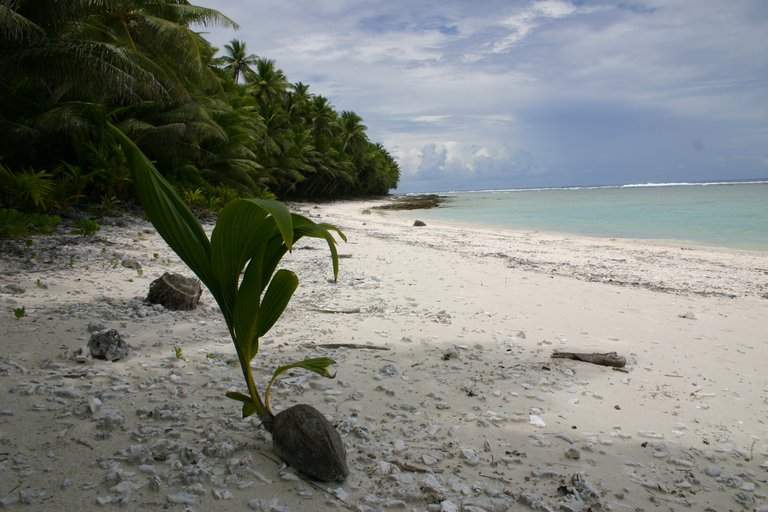(Approximation to An island of Rafael Cadenas)
Greetings, dear readers.
In 2018, the Queen Sofia Prize for Hispanic American Poetry was awarded to Venezuelan poet Rafael Cadenas, considered not only the leading living poet of Venezuelan literature (currently 89 years old), but also one of the fundamental voices of contemporary Spanish-speaking poetry. He had already been recognized by the FIL Prize for Literature in Romance Languages awarded by the Guadalajara Book Fair (Mexico) and the García Lorca Poetry Prize awarded in Granada (Spain), and his work translated into several languages. There are numerous digital references about Cadenas and its production (see
I am an almost fervent follower of the poetic work and thought of Cadenas. I share with you one of my works about him, in this case, on his little-known book: An island.

Rafael Cadenas
It is possible to remember every moment we forget, and so, remember.
Rafael Cadenas
"Port of Spain-Caracas, 1958" : this is the brief colophon that closes the collection of poems An island (1) of Cadenas. Referential data that tells us about specific genetic conditions of the work. Temporary inscription that allows its location in the whole of the poetry of this writer. Geographic register (capital of the islands of Trinidad and Tobago) that gives us a moment of the author's life, in which the possible spatial motivation of the book is located.
With this I do not intend to circumscribe the existence of An island to a simple external reference to it; I only suggest, from the outset, a possible sense of concretion, of vital belonging, so expensive to the conception of Chains.
An island, title and textual body, is revealed to us as a foundational metaphor / symbol of a plurality of senses, nourished by the complex meanings with which the island has been associated in the traditional symbolic production of humanity, and which finds parallels in some rewritings of such meanings developed in universal literature (for example, The island of Aldous Huxley, Elogies by Saint-John Perse, Omeros by Derek Walcott). They are: the island as a primordial center, sacred by definition; the island as an image of the complete and perfect cosmos; the island as a refuge, symbol of retreat and solitude; the island in identification with women, as Chevalier and Gheerbrant point out, and Cirlot in their respective Dictionaries of Symbols.
An island seems to be built from the awareness of a fall ("my border with emptiness / has fallen today"), from the feeling of a loss ("All lost in a dense bundle of drizzle"), from the feeling of a loss ("All lost in a dense bundle of drizzle"), from the awareness of a fall ("my border with emptiness / has fallen today"), from the feeling of a loss ("All lost in a dense bundle of drizzle"). The island is a conjunction of the living, of the full real: "Excellence of the living over the lived", "Ocean like fruit that I approach to my mouth", says the speaker of the poems. This plenitude will be broken, it will be lost, like one who is torn from a land in bloom and abandoned to "a city of ice". It will only remain by evocation, by memory, as the breath of an exile. (An island is prior to The notebooks of exile by the same writer).
There is the detachment from that primeval shore that is nature, love, mystery, sacredness, to inhabit then the wound: "We breathe / separation. The schism / is our / refuge". That is why the voice speaks from the nostalgia of the lost, from the trace and the flavor that returns like "sacred foam on my lips forever". We read in one of his poems with a certain elegiac tone:
Island,
black bird,
incessant flame,
trip to where everything revolves
my paradise, my branch, my overflow
I've lost it
Who took the emerald?
Moisture from fugitive lights.
I've lost it
and I fall suddenly
in the vertigo of desperate hands.
The being who inhabited this "island separation", now detached, "without spell" before the "humiliated doors" of the city, was made and remaked by the grace filled with the real, primitively, in the immediacy. He found himself in things, in the other, open to mystery as a celebrant of love. Now he is remembered from the absence:
I was thin, vegetable, blue, steel leaf, mud, bonfire, stem.
I had moons, famines, music, cliffs, woman sea.
I was complete, submerged, burning, smelling of peanuts, smiling, sonorous, dressed. (p.29)

The above allows us to reach the moment that most interests us in this approach to An island. The fragments and poetic phrases quoted offer us a text full of images, although simple and devoid, in turn forged by / in the sensations of a recreated environment that identifies us, that is common to us. This way of presenting the poetic matter has led Luis Miguel Isava to point out that *** An island *** "is perhaps the most sensory book of Chains", an appreciation that I share, I would even add that it is a book of profound sensuality.
How is this sensoriality based? Why and how is it produced? The poetic body is configured with the signs of an identifiable geographical space, to which we have alluded biasedly. The voice is 'lived' and remembers in a physical and spiritual landscape that constitutes it in absence, in which it melts, to which it offers its gratitude or from which it distances itself. This being of presence and loss can only speak with the corporeality and strength of a living, simple, direct sensoriality.
Three axes mark this relationship: the look (and its implicit elements), love and memory. The first poem thus says: "I come from a strange kingdom, / I come from an illuminated island, / I come from the eyes of a woman".
This kingdom, where the real proves us with its nakedness and its fullness, can not be 'taken' but by the gaze. The image of the eyes is reiterated as waves in the text, and the image of light is united: the luminosity that shows us without trappings the faces of the real, which dissipates the fog of thought, which transparently and transparently: " You are on the edge of a time without eyelids "," I travel to transparent spaces "," Each bright day is another invitation ".
The speaker, returned to the world in which he passes "through hard streets", claims the "lost dynasties of the eyes". In the absence of that kingdom not dominated by conscience, exclaims: "There is no light that binds us (...) Give me back the glare / and the eyes that belong to it". The look and the light that accompanies it resemble the open vision of childhood. Fused with this vision, the voice announces:
My innocent eyes reconquer lost territories.
(...)
Penetrating in the absurd clarity, in the talkers
dawns of childhood, in puerility
of purity.
(...)
Splendor that you confuse with my childhood
That look, from the present of the glare or from the nostalgia of the disinherited, will walk through the material and feminine body of the island. It will witness your presence. He will return with the memory, trying to rescue his primordial existence. So we read:
Ships that travel to the sun,
drum music,
unshackled salts,
sea of naked children,
sailors unloading fragrant bananas.
City of heart of tree, of trembling humidities,
of reeds that dance.

We will also find fragments, such as the one I will quote extensively below, where that body is an island, woman and love, praised with the sensuality of the look and the evocation:
I remember the sunrise when very slowly things came back,
I remember the sunrise surrounding the harbor, its faint light that
it gathered us separating us,
I remember the dawn falling on you, on me, on the
patio, the wooden house, the zinc fences,
I remember the sunrise when he lay in the curtains, the
fabrics adhered to its trail, its yellow mass
in your sleepy voice,
I remember the dawn in your black hair lying on
the bed or bathing yourself or leaving your fragrance
The island and the woman, as I have pointed out, play in ambivalence. The love of this tested lover is the point for the encounter and the revelations. To them (love and mystery) he calls and sings:
Although you do not know me in my body, the same sea trembles
that in your veins dance.
You show up,
you are naked
you enter the light,
you awaken the colors,
you crown the waters,
(...)
your body is an arrogant
palace
where
lives
the
tremor.
The experience of the "island" - of the splendid and primordial plenitude of the real - is not subject to consciousness, to the realm of memory. It is experience in "radical ignorance" (as the author would say in * Annotations *), from a subjectivity that becomes one with the environment:
It's night at Point Cumana.
Here he forgets, I do not think, I lose sight of my age, I do not even notice myself. I only know that I walk, I go and I come, I pass, without conscience.

But broken the bond, lost the center, only the memory is erected in the hollow of the "strange kingdom". Memory "jumps suddenly to bite" and is exile from the open and unique space, Rilke would say. That other space, that of exile, located "between memory and a blind street", will make you say:
In this city nobody listens to the wind,
nor the foliage that inclines to the earth as trophies,
nor the flesh of imperious glitters,
nor the shaky wells. This is your exile, memory.
The lover, subjected to trial, exalted and fallen back to rise, knows that he still belongs to a kingdom where love is sought: the word. He will name it "Sober, / flaming, / insecure word." It will impregnate it from the awareness of its loss:
Ay incandescent letters
stuck to my lips
like a singing
that came and I forgot and I still want
He will assume his condition and destiny: "My word will always be born where the sand begins".
Even in misguidance, the lover learns. While out of the "island", his desire to join her has not been broken. Now settle from his dwelling in the "house without trappings"; Watch, love, write down. Hence this poem that we can say with the speaker:
Island breathing, the one that you disinherited so that
Hold with your memory, love you.
In you he lived, he grew as a kiss, he became thin
in front of the moon, it was conquered.
Now he makes offerings in the open, he drowns without
key, it is sustained in its shipwreck.
Since then he is an inhabitant.
(1) Until the publication of the * Poetic Anthology * of Cadenas by Monte Ávila Editores in 1991, only one mimeographed version of this book of poems was known. The quotes are taken from that edition, although there is a later complete edition.
Bibliographic references
Cadenas, Rafael (1996). Anthology (3rd edition). Venezuela: Monte Ávila Editores.
Cadenas, Rafael (2000). Entire work. Poetry and prose (1958-1995). Mexico: Economic Culture Fund.
Chevalier, Jean and Gheerbrant (1982). Dictionnaire des symboles. France: Editions Robert Laffont.
Cirlot, Juan-Eduardo (1982). Dictionary of symbols (5th edition). Spain: Editorial Labor.
</ div>
Thank you for your reading. Until a next opportunity.
Written by @josemalavem
Click on the coin to join our Discord Chat

Witness proposal is here:
Go To Steem Witness Page
In the bottom of the page type: adsactly-witness and press vote.

Use small letters and no "@" sign. Or, click here to vote directly!
Thank you!
love poetry ;)
And, we are all islands? Islands in concrete cities that seek to find the sensations of other islands? Islands that have memory? A very beautiful essay @josemalavem for a poet very committed to the beauty of letters. For me the poet Rafael Cadenas (I'm not a literary critic) is transfigured with each metaphor. I feel that he writes for the heart of an island-woman, of a memory-woman, of a space-woman. Thank you @josemalavem for your reflections about this important twentieth century Venezuelan writer. @Adsactly Thanks for spreading this beautiful publication
My gratitude to you, @marcybetancourt, for your reading of my post and your lucid commentary. Indeed, Cadenas plays at that ambivalence, which he will take up in later books, in Memorial and in Amante, for example: the woman, the word, reality. As I indicate in the text, the island image is symbolically charged with various meanings, and the poetry of this book interacts with them as well. Greetings.
Hi, @adsactly!
You just got a 0.3% upvote from SteemPlus!
To get higher upvotes, earn more SteemPlus Points (SPP). On your Steemit wallet, check your SPP balance and click on "How to earn SPP?" to find out all the ways to earn.
If you're not using SteemPlus yet, please check our last posts in here to see the many ways in which SteemPlus can improve your Steem experience on Steemit and Busy.
Hola adsactly,
Tu post ha sido seleccionado por el bot de @provenezuela, te hemos dado un voto en apoyo a los autores venezolanos!
Gracias por ser parte de nuestra comunidad!
Gracias por su apoyo, @provenezuela.
Good to read.